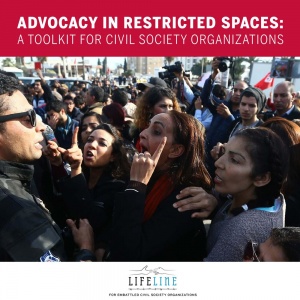Advocacy in Restricted Spaces: A Toolkit for Civil Society Organizations
Lifeline launched its advocacy toolkit
A practical resource that emphasizes that advocacy is possible even in restrictive contexts
The toolkit places the planning process within the context of risk assessment and mitigation, which is essential in these environments.
“The COVID-19 crisis has increased authoritarian restrictions on civil society globally. Though this toolkit was produced prior to the pandemic, the case studies included speak to a moment when advocacy needs to navigate around such restrictions,” said the group in its website.
The toolkit includes:
- – A step-by-step guide for advocacy planning that stresses risk mitigation and intersectionality.
- – 10 tactics that can be used in restrictive spaces including “Engaging with Unlikely Allies,” “Addressing Slander, Stereotypes, and Stigmatization,” and “Creative Cultural Resistance”.
- – 16 case studies with real-world examples of how CSOs achieved success with their advocacy.
- – Links to over 50 external resources related to advocacy planning and security.
- – Annexes related to digital security, well-being, risk assessment, and stakeholder mapping to enable CSOs to prevent and mitigate threats at each stage of their campaigning.
The group said the toolkit is unique in the sense that it looks at advocacy where fundamental freedoms are restricted, includes real world examples with concrete impact, and incorporates risk mitigation as a core part of the strategy. Read more here.
A workshop was also held to explore effective advocacy in restricted spaces using the new toolkit. Watch below:
The Lifeline Embattled CSO Assistance Fund was launched with the support of 12 governments in June 2011 to push back against a global trend of closing civil society space.








